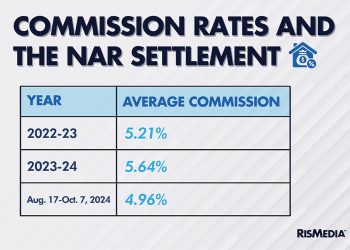More than 15 percent of U.S. consumers have personally experienced housing discrimination as they attempted to rent or purchase a property, according to a new Homes.com survey of 2,000 adults. The poll comes at a time when a federal rule establishing stricter requirements to bring discrimination claims under the Fair Housing Act is being challenged by civil rights groups.
Survey respondents reported encountering bias in one or more scenarios including rental applications (7 percent), home financing (4 percent), home searching with an agent (3 percent), home appraisals (3 percent) and/or other residential purchase services (3%).
Black respondents were the most likely to face housing bias (56 percent), followed by biracial/multiracial (45 percent), Latinos/ Hispanics (45 percent), American Indians/Alaskan Natives (31 percent) and non-Hispanic whites (12 percent). The problem also spanned every income level from less than $100,000 to more than $500,000.
The survey also revealed that:
– Two-thirds of respondents believe housing discrimination exists in their community in varying degrees, with just 33 percent saying it is “not common at all.” The “not common” response was highest in the Northeast with 40 percent expressing that opinion.
– Sixty percent do not know how to report Fair Housing law violations or concerns, despite the fact that one-fifth of that group indicated they had experienced housing discrimination.
– Thirty percent are unfamiliar with any of six key federal housing programs, including Federal Housing Administration loans, Section 8 housing vouchers, private mortgage insurance, the Truth in Lending Act, the Making Home Affordable program and the Quality Housing and Work Responsibility Act. More than half of the respondents unfamiliar with any of these programs have annual household incomes of less than $100,000 a year.
– Thirty-seven percent cited down payment assistance programs as the most useful strategy to help low-income families buy homes, followed by mortgage assistance programs (34 percent), home repair grants (23 percent), tax credits for buying homes in certain areas (21 percent) and housing voucher programs (17 percent).
– Thirty-one percent believe the No. 1 hurdle to homeownership for low-income families is insufficient affordable housing, with 38 percent of those respondents residing in the West. Other obstacles cited included down payment costs (30 percent), lack of access to stable employment (16 percent), mortgage payment costs (15 percent) and not enough housing inventory (9 percent).
– Sixty-two percent believe that federal housing policies should actively encourage diverse communities, highlighting the nation’s growing social desire to challenge existing remnants of community segregation in favor of inclusivity and equality.
“Homes.com is passionate about, and committed to, providing education and resources that champion equal access to housing for all,” stated Dave Mele, president of Homes.com. “These survey insights highlight how the real estate industry can help consumers achieve their housing needs, which is why Homes.com is launching a platform to provide those resources.”
Earlier this year, Homes.com formed a Fair Housing work group, dedicated to understanding the history of fair housing, the current status of fair housing progress, and providing those educational resources to consumers. In the coming weeks, Homes.com will launch a dedicated resource page to provide consumers with the latest news in Fair Housing, guidance on how to submit Fair Housing concerns, information on existing programs to assist renters and buyers, and more. This is one of the first projects to reinforce Homes.com’s commitment to equipping consumers in a readily accessed way.
For more information, please visit www.homes.com.












I hate that we have to report on this topic and don’t want to diminish the likelihood that some discrimination exists across people of every color, race, gender-even white males.
But to say “15% of US consumers” is extremely inflammatory and harmful. Why not simply report the statistic…15% of the 2000 people surveyed. How many actually responded? How many of those completed a housing purchase or did not for what reasons? There are 330,000,000 million people in this country.
I think if 85% of those surveyed did not feel discriminated against is pretty good given the world climate today.
We will never have 100% or 0% of anything
All of these things are illegal now and have been for 50 years. Just like speeding. I feel it’s mostly an enforcement issue as evidenced by 60% not knowing how to report violations.
62% believe Fed policy should encourage diverse Communities? Does that mean respondents believe communities should have a certain number of each race in a community? And that is what Fed policy should encourage? Really, that sounds like racism to me. Let the people decide where they want to live.
Insufficient affordable housing is caused by local government regulations and zoning.
Is the discrimination illegal or the participants weren’t qualified? I think it is important to distinguish the differences.